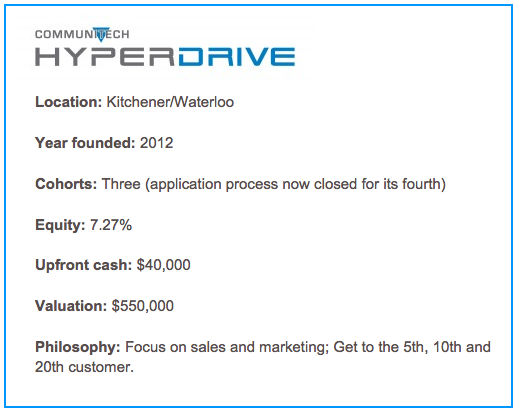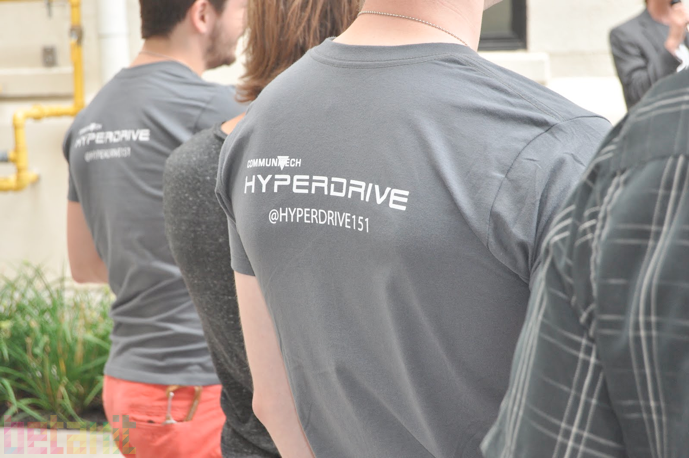
The Accelerator Series is a multi-part spotlight on Canada’s startup accelerators and the people who lead them.
Entering Its Fourth Cohort, Hyperdrive Looks to Put the Pedal to the Metal
Doug Cooper wants his startups in the Hyperdrive accelerator program to get their next 5, 10, and 20 customers. That’s what he ultimately defines as “successful” for the 29 small businesses that have gone through the program, and the next batch that will be selected this month.
It’s a fair philosophy to have in 2014 in a Canadian accelerator industry that’s still young, and arguably has yet to actually achieve a financially sustainable business model. The oldest accelerator program in Canada, Montreal’s FounderFuel, is just three years old.
From Kitchener-Waterloo via Skype, Cooper said that the program, located in the Communitech hub is six months in duration primarily because of its focus on customer acquisition. At Hyperdrive, the first three months of the program are devoted to validating a need in the market for a given startup, with the later three focusing on sales.

“The reason we added that sales and marketing component was because that’s where most companies got left at the door,” Cooper told BetaKit. “They’d say, ‘I found that I validated that people want this solution, but I don’t know how to get another 20 of them.’ So we measure ourselves on this kind of success.”
Every accelerator in Canada is a bit different when it comes to philosophy, with some placing heavy emphasis on preparing a startup for investor pitches. Others focus on user acquisition, while some encourage product development. In Canada there seems to be eight (unofficially) recognized legitimate startup accelerators, and they all comes their perks and downsides for a company looking to enter.
But Hyperdrive has always been different, mainly because it resides in what many have labeled Canada’s “startup hub”, Waterloo. It’s the twin city with Kitchener that produced the now embattled BlackBerry, the smartphone company that grew to be one of Canada’s most successful technology companies. The University of Waterloo, with its VeloCity incubation Garage, consistently churns out young, bright tech entrepreneurs.
With a population of 500,000 and over 1,000 startups, something is up in Kitchener-Waterloo. Cooper called that figure “incredible.” For Communitech’s accelerator program, it’s a great place to be.

In Canada, some accelerators have been able to take advantage of government funds, while several other have not. Hyperdrive’s non-profit parent entity Communitech received $15 million over three years a few months back. This arguably puts more pressure on the accelerator to churn out successful companies.
Cooper emphasized that the money handed to startups who enter the program ($40,000 for 7.27 percent at a valuation of $550,000) is coming from private LPs, and not public coffers.
“The operating expenses come out of public money and that’s some of the money that we can defray over time,” he said. “We’re not operating that way yet. We have some ideas involving sponsorship, events, and other things that will allow us to get closer to require any public money, and that will take time.”
In this space, taking time seems to be the method in the pursuit of sustainability. Just like how the most experienced accelerator in Canada has just three years under its belt, Cooper said Hyperdrive continues to mature. “This is not an endeavor that has a lot of history, where people could pick up a book off a shelf that says, ‘this is how you do it.’ We’re figuring it out as we go along and the way I did the last cohort is different than the one I did before that, and that’s because just like a startup, we learn at the end of every cohort,” he said.

The managing director offered that about 30 percent of Hyperdrive’s 29 portfolio companies are “likely to go on to a series A investment round over the next year,” those that he defines as examples of the program’s success.
Some notable names to come out of Hyperdrive have been Will Pwn 4 Food, Cream.HR, Dandy, ESL Explorer, Beanworks and Plasticity. Cooper pointed to the later three as exemplary companies who came in to the program and identified a problem that needed to be solved.
ESL Explorer is the “Expedia for the $4B English as Second language travel industry,” Beanworks is a Saas, browser-based accounts payable solution and Plasticity helps companies between 1 and 2,000 employees increase their engagement.
Cooper predicted that both the accelerator and Kitchener-Waterloo will see a higher concentration of hardware startups, given the recent success of companies like Thalmic Labs, Pebble and many other smaller startups. Part of that recent zeitgeist, he said, is due to the University of Waterloo with its strong emphasis on nanotechnology and mechatronics. Cooper said it’s a regular scouting spot for Hyperdrive.
As for Cooper background, he’s the guy who built up Intel Canada over 28 years, retiring in 2011. Having served on the Communitech board for quite some time, he was approached after the conclusion of Hyperdrive’s first cohort, and was asked if he could lead the program. With mostly corporate experience, he questioned himself whether he could meet the demands, let alone others who may have wondered the same thing.
Building Intel Canada, as he explained, wasn’t exactly a breeze. “I literally came into the job with no idea of how I would get it to the structure it has right now. In many ways it was a startup.”
After having lead several cohorts of ambitious, seed-stage startups, Cooper has found much inspiration from the founders and their desire to work, not to mention their desire to make something out of nothing. “It’s very much infectious,” he said, being able to talk to people who wake up in the morning, excited with what they’re going to accomplish that day.
Now as he prepares to select and lead Hyperdrive’s fourth cohort, the managing director seems to have come full-circle back to his “tech roots”. Like what he did with Intel Canada, he’ll be leading young tech entrepreneurs who need his help. He’ll also be guiding the future of a program that we’ve only just seen glimpses of thus far.
